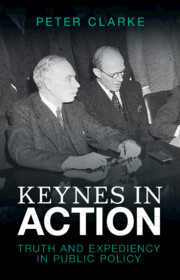Book contents
- Keynes in Action
- Keynes in Action
- Copyright page
- Dedication
- Contents
- Acknowledgements
- Introduction
- 1 What Really Happened at Paris? Keynes and Dulles
- 2 What Really Happened at Paris? The War Guilt Clause
- 3 ‘You Are Very Famous, Maynard’
- 4 The Truth About Lloyd George
- 5 Yielding to Ramsey
- 6 Yielding to Realities
- 7 Truths between Friends
- 8 Truths between Friends
- 9 The Road to Bretton Woods
- Conclusion
- Bibliography
- Biographical Works on Keynes
- Index
7 - Truths between Friends
Cambridge and Economics
Published online by Cambridge University Press: 04 November 2022
- Keynes in Action
- Keynes in Action
- Copyright page
- Dedication
- Contents
- Acknowledgements
- Introduction
- 1 What Really Happened at Paris? Keynes and Dulles
- 2 What Really Happened at Paris? The War Guilt Clause
- 3 ‘You Are Very Famous, Maynard’
- 4 The Truth About Lloyd George
- 5 Yielding to Ramsey
- 6 Yielding to Realities
- 7 Truths between Friends
- 8 Truths between Friends
- 9 The Road to Bretton Woods
- Conclusion
- Bibliography
- Biographical Works on Keynes
- Index
Summary
This chapter and the next explore a tension between two different worlds in which Keynes moved – himself apparently equally at ease in either. One of these was Cambridge, where his idiosyncratic relationship with the Economics Faculty was by no means what we would expect of an academic economist today. Instead we find him relying upon networks of friendship, with some important links going back to his early days as a member of ‘the Apostles’ in Cambridge. The writing of his major economic works, The Treatise on Money (1930) and the General Theory (1936) was thus crucially influenced in a way that we would today regard as quite unprofessional.
- Type
- Chapter
- Information
- Keynes in ActionTruth and Expediency in Public Policy, pp. 158 - 171Publisher: Cambridge University PressPrint publication year: 2022

